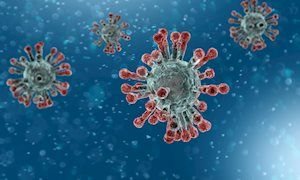15 January 2018
Meningitis is the most severe manifestation of tuberculosis (TB), leading to death or disability in at least 50% of those affected. Diagnosis is difficult, and optimal antibiotic treatment has not been defined. TB meningitis is relatively rare, with approximately 20 cases per year in the Netherlands. Reinout van Crevel, professor in Global Health and Infectious Diseases, has worked on TB meningitis with colleagues at Padjadjaran University / Hasan Sadikin hospital in Bandung, Indonesia for over 10 years. In previous studies van Crevel and colleagues have focused on diagnosis of TB meningitis and shown that intensified antibiotic treatment with a higher dose rifampicin reduces mortality of TB meningitis (Ruslami et al, Lancet Inf Dis 2013).
Immunopathology contributes to the high mortality of tuberculous meningitis, but it is mostly unknown which biological pathways are involved, and corticosteroids are onbly effective in reducing mortality in some patients. As part of his PhD studies, Arjan van Laarhoven (PhD) has used the established Indonesian cohort and bioarchive of over 800 patients with TB meningitis to identify what pathways are involved in poor outcome of TB meningitis.
More than 400 metabolites were measured in archived CSF and serum samples from a discovery set of patients. Most CSF metabolites levels were higher in TBM patients, especially in those who died during follow-up. CSF tryptophan concentrations showed a different pattern: concentrations were much lower in patients who survived compared to patients who died (9-fold) and to controls (31-fold). The association of low CSF tryptophan with patient survival was confirmed in the second cohort of over 100 patients. Finally, genome-wide SNP typing was used to identify tryptophan quantitative trait loci (QTLs), and these same loci strongly predicted mortality in a third analysis in a third cohort of 285 TB meningitis patients.
These findings clearly demonstrate that cerebral metabolism of tryptophan, an essential amino acid which is known to affect Mycobacterium tuberculosis growth and central nervous system inflammation, is critical for the outcome of TB meningitis.
This study is important for three reasons. First, it has led to a real new insight in the pathways that may be involved in the immunopathology and death of tuberculous meningitis, the most dramatic and lethal manifestation of tuberculosis. These findings are a first step towards more effective, and possibly personalised host-directed therapy in TB meningitis, and possibly in other brain infections. Second, this is the study first that links metabolomics and genome-wide genotyping with mortality of tuberculosis in a 'systems approach’. This expertise builds on the functional genomics work that Mihai Netea from the department of Internal Medicine has established with many collaborators in- and outside Radboudumc. Third, this study is evidence of the scientific and clinical impact of long-term collaboration in infectious disease research with partners in Indonesia and other tropical countries.
 Arjan van Laarhoven, theme Infectious diseases and global health and colleagues report a completely new insight regarding the high mortality of TB meningitis in Lancet Infectious Diseases this week.
Arjan van Laarhoven, theme Infectious diseases and global health and colleagues report a completely new insight regarding the high mortality of TB meningitis in Lancet Infectious Diseases this week.
Meningitis is the most severe manifestation of tuberculosis (TB), leading to death or disability in at least 50% of those affected. Diagnosis is difficult, and optimal antibiotic treatment has not been defined. TB meningitis is relatively rare, with approximately 20 cases per year in the Netherlands. Reinout van Crevel, professor in Global Health and Infectious Diseases, has worked on TB meningitis with colleagues at Padjadjaran University / Hasan Sadikin hospital in Bandung, Indonesia for over 10 years. In previous studies van Crevel and colleagues have focused on diagnosis of TB meningitis and shown that intensified antibiotic treatment with a higher dose rifampicin reduces mortality of TB meningitis (Ruslami et al, Lancet Inf Dis 2013).
Immunopathology contributes to the high mortality of tuberculous meningitis, but it is mostly unknown which biological pathways are involved, and corticosteroids are onbly effective in reducing mortality in some patients. As part of his PhD studies, Arjan van Laarhoven (PhD) has used the established Indonesian cohort and bioarchive of over 800 patients with TB meningitis to identify what pathways are involved in poor outcome of TB meningitis.
More than 400 metabolites were measured in archived CSF and serum samples from a discovery set of patients. Most CSF metabolites levels were higher in TBM patients, especially in those who died during follow-up. CSF tryptophan concentrations showed a different pattern: concentrations were much lower in patients who survived compared to patients who died (9-fold) and to controls (31-fold). The association of low CSF tryptophan with patient survival was confirmed in the second cohort of over 100 patients. Finally, genome-wide SNP typing was used to identify tryptophan quantitative trait loci (QTLs), and these same loci strongly predicted mortality in a third analysis in a third cohort of 285 TB meningitis patients.
These findings clearly demonstrate that cerebral metabolism of tryptophan, an essential amino acid which is known to affect Mycobacterium tuberculosis growth and central nervous system inflammation, is critical for the outcome of TB meningitis.
This study is important for three reasons. First, it has led to a real new insight in the pathways that may be involved in the immunopathology and death of tuberculous meningitis, the most dramatic and lethal manifestation of tuberculosis. These findings are a first step towards more effective, and possibly personalised host-directed therapy in TB meningitis, and possibly in other brain infections. Second, this is the study first that links metabolomics and genome-wide genotyping with mortality of tuberculosis in a 'systems approach’. This expertise builds on the functional genomics work that Mihai Netea from the department of Internal Medicine has established with many collaborators in- and outside Radboudumc. Third, this study is evidence of the scientific and clinical impact of long-term collaboration in infectious disease research with partners in Indonesia and other tropical countries.
Related news items

Antibodies are sustained in nasal fluid after mild corona infection
27 September 2021 Testing through nasal fluids is easier than through blood go to page
Less inflammation with a traditional Tanzanian diet than with a Western diet
18 February 2021 Study shows differences between western and traditional diet. go to page
Trained immunity: a tool for reducing susceptibility to and the severity of SARS-CoV-2 infection
17 February 2021 In a review in Cell Mihai Netea, Frank van de Veerdonk, Reinout van Crevel and Jorge Dominguez Andres propose that induction of trained immunity by whole-microorganism vaccines may represent an important tool for reducing susceptibility to and severity of SARS-CoV-2. go to page
ZonMw grants to study optimal use of COVID-19 vaccines in patients with impaired immune systems
3 February 2021 How do people with reduced immunity, especially kidney patients, react to a COVID-19 vaccination? And how can patients with peripheral arterial disease be helped by DNA testing? Our researchers received grants from ZonMw to make these studies possible. go to page

